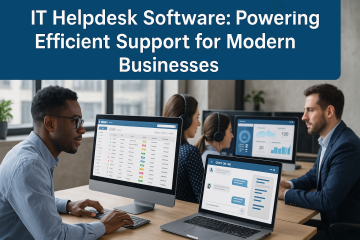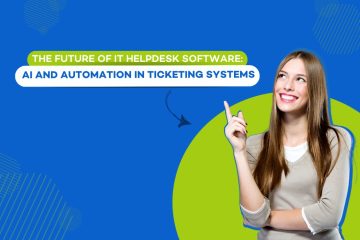An IT ticketing system is an essential tool in IT service management, enabling organizations to effectively handle and resolve IT support requests efficiently. By opening, tracking, and handling tickets, it makes sure that all IT problems are resolved right away leading to the best possible service quality as well as user satisfaction.
Understanding IT Ticketing Systems
How IT Ticketing Systems Work
An issue arising prompts the creation and categorization of tickets in a structured manner in an IT ticketing system. The next step involves directing these tickets at the relevant IT support staff for issue resolution. This usually engages various players such as end users who report problems to help fix them, IT support teams to fix them and management overseeing all such events happening within.
Types of IT Ticketing Systems
- Standalone Systems: These systems are dedicated for focus on ticket management only.
- Integrated IT Service Management (ITSM) Suites: Part of a wider ITSM framework that holds other IT practices such as asset management and change management are these systems.
- Cloud-Based vs. On-Premise Solutions: The flexibility and scalability of cloud-based solutions are what set them apart from on-premise solutions, since these solutions can be controlled and customized by their users.
Uses of IT Ticketing Systems
Incident Management
Incident management uses IT ticketing systems to allow organizations to systematically register, monitor and resolve IT problems. They facilitate ranking of incidents by harshness and level of impact.
Service Request Management
These systems simplify user requests for new resources or services. They automate authorization procedures, thereby guaranteeing speedy and efficient service provision
Problem Management
AI ticketing systems are used to identify and solve root causes of recurrent incidents that are taking place within the company. IT support system software allows to carry out an in-depth analysis aimed at finding out what causes system failures and how can we avoid making the same mistakes again in future.
Change Management
To avoid disturbances, it is critical to manage changes in the IT environment. A proper implementation of changes with minimal impact on the operations is guaranteed by the IT ticketing systems.
Asset Management
These systems track IT assets from procurement to disposal. This helps in effective resource management by providing information on asset utilization.
Key Features of IT Ticketing Systems
Ticket Creation and Categorization
Ticketing systems utilized by IT departments enable effective opening of trouble tickets by end users through different communication platforms such as mail, portals, and phone calls. Besides, these systems often feature facilities that permit easy classification and assignment of keywords to every ticket.
Workflow Automation
Systems operating a core feature in this regard involve automation that routes and escalates tickets using set guidelines; they ensure quick handling of tickets while meeting Service Level Agreements, SLAs.
Knowledge Base Integration
Enabling integration with a knowledge base allows users as well as support teams to quickly access relevant pieces of information that support self-service options as well as cuts down on ticket amounts.
Reporting and Analytics
Real-time dashboards along with comprehensive reporting tools reveal performance metrics. This supplies analytics necessary for measuring efficiency thereby identifying areas that need improvement.
User Communication Tools
Users are being made aware about the state of their tickets and notifications through chat and email that are combined communication channels, which leads in a rise in transparency and user satisfaction.
Customization and Scalability
They are also organized to accommodate organizations with similar objectives or practices for easy access by their target users.
Benefits of Using IT Ticketing Systems
Improved Efficiency
IT ticketing systems significantly improve operational efficiency as a result of streamlining processes and reducing manual work which in turn leads to faster resolution times.
Enhanced User Satisfaction
The system updates users’ status frequently enough leading to satisfaction. It is possible for ordinary users to manage small problems without requiring any assistance.
Better Visibility and Accountability
Ensuring accountability is made possible by clear tracking of all tickets thus enabling one to monitor their progress while also ensuring that they are resolved as soon as possible.
Data-Driven Decision Making
Organizations are continuously able to better their IT service management by leveraging data-based decisions made possible through insights derived from analytics and reporting.
Conclusion
Efficient IT service management depends hugely on IT ticketing systems. There are a lot of things they can be used for like incident and problem management, asset tracking etc., with built-in features for improved efficiency and client fulfillment.
Your IT service management will be transformed upon implementation of an IT ticketing system. Seek performance marketing services or consult the best web development Company in Delhi for optimizing your IT procedures through an efficient customized solution.



0 Comments